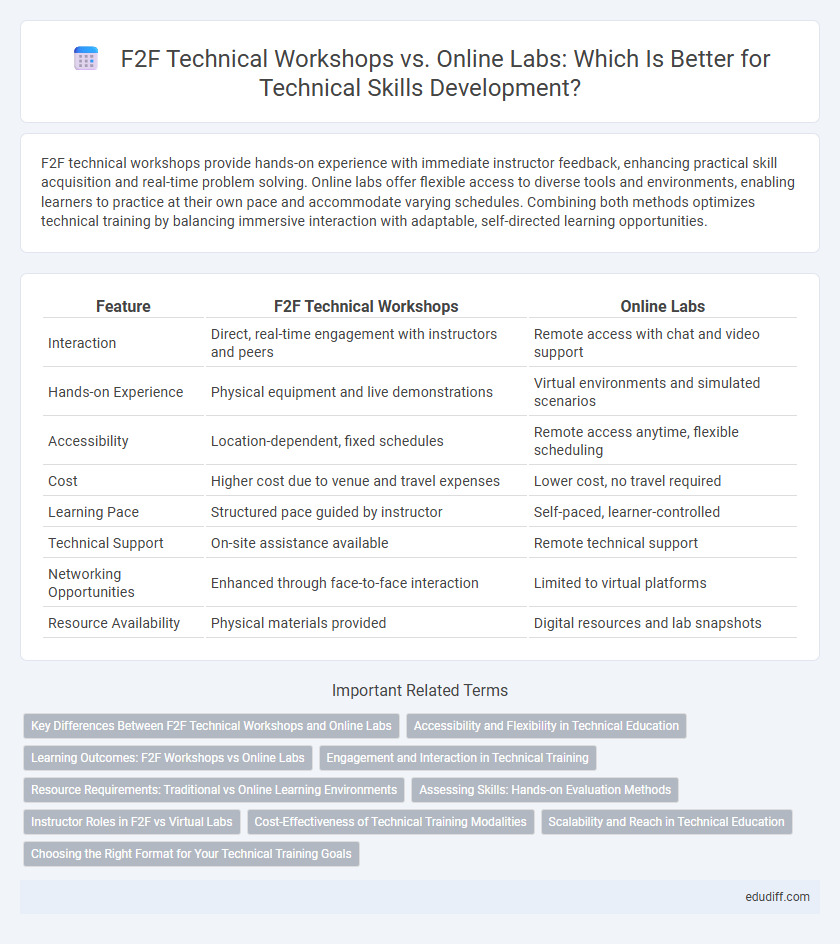F2F technical workshops provide hands-on experience with immediate instructor feedback, enhancing practical skill acquisition and real-time problem solving. Online labs offer flexible access to diverse tools and environments, enabling learners to practice at their own pace and accommodate varying schedules. Combining both methods optimizes technical training by balancing immersive interaction with adaptable, self-directed learning opportunities.
Table of Comparison
| Feature | F2F Technical Workshops | Online Labs |
|---|---|---|
| Interaction | Direct, real-time engagement with instructors and peers | Remote access with chat and video support |
| Hands-on Experience | Physical equipment and live demonstrations | Virtual environments and simulated scenarios |
| Accessibility | Location-dependent, fixed schedules | Remote access anytime, flexible scheduling |
| Cost | Higher cost due to venue and travel expenses | Lower cost, no travel required |
| Learning Pace | Structured pace guided by instructor | Self-paced, learner-controlled |
| Technical Support | On-site assistance available | Remote technical support |
| Networking Opportunities | Enhanced through face-to-face interaction | Limited to virtual platforms |
| Resource Availability | Physical materials provided | Digital resources and lab snapshots |
Key Differences Between F2F Technical Workshops and Online Labs
F2F technical workshops provide hands-on interaction and real-time collaboration, enhancing immediate feedback and problem-solving with physical equipment. Online labs offer flexible access to virtual environments, enabling remote participation and scalable resource allocation without geographical constraints. Key differences include the tactile experience and networking opportunities in F2F settings versus the convenience and cost-effectiveness of online labs.
Accessibility and Flexibility in Technical Education
Face-to-face technical workshops provide immersive, hands-on learning experiences with immediate instructor feedback, fostering deeper understanding through real-time interaction. Online labs offer unparalleled accessibility and flexibility, enabling learners worldwide to engage with technical content at their own pace and on diverse devices. Emphasizing hybrid models can maximize educational reach by combining the tactile benefits of in-person sessions with the convenience of remote access.
Learning Outcomes: F2F Workshops vs Online Labs
Face-to-face (F2F) technical workshops enhance hands-on learning through direct instructor interaction and immediate feedback, improving skill acquisition and retention. Online labs offer flexible, self-paced environments that support repetitive practice and accessibility but may lack real-time guidance, potentially affecting complex problem-solving skills. Studies indicate F2F settings yield higher engagement and deeper understanding, while online labs excel in scalability and convenience for diverse learning styles.
Engagement and Interaction in Technical Training
F2F technical workshops foster higher engagement through direct, real-time collaboration, hands-on activities, and immediate feedback, enhancing skill acquisition and problem-solving abilities. Online labs provide flexible access to resources and self-paced learning but often experience limited interaction, which can reduce motivation and active participation. Blending both methods leverages the strengths of in-person engagement with the convenience of virtual accessibility to maximize technical training effectiveness.
Resource Requirements: Traditional vs Online Learning Environments
F2F technical workshops demand significant physical resources such as dedicated lab spaces, specialized equipment, and on-site instructors, ensuring hands-on experience but limiting scalability. Online labs reduce physical constraints by utilizing virtual environments and cloud-based tools, enabling flexible access and easier resource management across diverse geographic locations. The shift to online learning environments optimizes resource allocation by minimizing infrastructure costs and allowing real-time usage monitoring, critical for technical skill development.
Assessing Skills: Hands-on Evaluation Methods
F2F technical workshops provide direct, immersive skill assessments through real-time problem-solving and equipment handling, enabling immediate feedback on participants' expertise. Online labs utilize virtual environments with automated scoring and activity tracking to measure proficiency, offering scalable and flexible evaluation options. Both methods employ hands-on evaluations but differ in interaction dynamics and adaptability to individual learning paces.
Instructor Roles in F2F vs Virtual Labs
Instructor roles in F2F technical workshops involve real-time hands-on guidance, immediate troubleshooting, and personalized interaction to enhance learner comprehension and engagement. In virtual labs, instructors facilitate remote support through screen sharing, live chat, and asynchronous feedback, prioritizing digital collaboration tools to monitor and assist participants effectively. The dynamic instructor presence in F2F settings contrasts with the adapted facilitation strategies necessary for maintaining engagement and addressing technical challenges in online environments.
Cost-Effectiveness of Technical Training Modalities
F2F technical workshops often incur higher costs due to venue rentals, travel expenses, and material logistics, whereas online labs reduce overhead by leveraging virtual environments and accessible digital resources. Training providers report that online labs enable scalable sessions with lower per-participant expenses, increasing affordability for organizations with large or geographically dispersed teams. Cost-effectiveness analysis reveals online labs significantly decrease fixed and variable costs while maintaining interactive and practical learning experiences essential for technical skill development.
Scalability and Reach in Technical Education
F2F technical workshops offer intensive hands-on experiences but face limitations in scalability and geographic reach due to venue capacity and travel constraints. Online labs leverage cloud-based platforms to enable simultaneous access for a global audience, significantly enhancing scalability and inclusivity in technical education. The integration of virtual environments allows continuous updates and resource sharing, optimizing engagement and knowledge retention across diverse learner populations.
Choosing the Right Format for Your Technical Training Goals
Face-to-face (F2F) technical workshops provide hands-on experience and direct interaction with instructors, enhancing practical skill acquisition and immediate feedback. Online labs offer flexible access to a wide range of technical environments, allowing learners to practice at their own pace with scalable resources and minimal logistical barriers. Selecting the appropriate format depends on specific training objectives, such as the need for real-time collaboration or independent, self-paced skill development.
F2F Technical Workshops vs Online Labs Infographic

 edudiff.com
edudiff.com